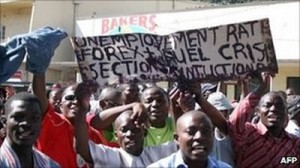 In April of this year, Malawian president Bingu wa Mutharika delivered his state of the nation address, entitled “A Promise Delivered.” From what is currently happening in the country (which some observers liken to the ongoing uprising in the Arab world), nothing even remotely resembles the fulfillment of this speech. As far as I can make out, things in Malawi look more like a promise undelivered. 19 people have reportedly been killed by the police in an attempt to squash the rising anti-government protests.
In April of this year, Malawian president Bingu wa Mutharika delivered his state of the nation address, entitled “A Promise Delivered.” From what is currently happening in the country (which some observers liken to the ongoing uprising in the Arab world), nothing even remotely resembles the fulfillment of this speech. As far as I can make out, things in Malawi look more like a promise undelivered. 19 people have reportedly been killed by the police in an attempt to squash the rising anti-government protests.
Here’s the deal: Unleashing soldiers and police on peaceful citizens’ demonstration protesting against economic mismanagement is not delivering a promise. . . Signing a bill into law that bans any publication deemed not to be in the public interest (including a law that makes it impossible for individuals to obtain a court injunction and seek judicial redress against the government) cannot be termed a promise delivered. Nor can postponing the local Government Elections, which were supposed to prepare for Local Government Elections in April, mean a promise delivered.
Stifling academic freedom, as with the detention of Dr. Blessings Chinsinga for discussing the Arab uprising during a Political Science lecture, is not a promise delivered. Currently four Chancellor College lecturers, including Dr Chinsinga and Dr Jessie Kabwila-Kapasula, have been fired under mysterious circumstances. And neither is lavish spending to promote your own book (as the president did in January) a promise delivered.
Expelling the British High Commissioner from Malawi for a leaked embassy cable that referred to you as “autocratic and intolerant of criticism” is not delivering a promise. In response, the UK (the largest aid donor to Malawi) decided to go on the offensive by expelling the Malawian representative and freezing all new aid, the country’s main life support (40% of Malawi’s budget comes from international aid). The outcomes: Fuel and energy shortages, severe foreign exchange (forex) shortages, and depreciation of Malawi’s local currency, the kwacha.
But the big picture is that wa Mutharika’s behaviors and his response to citizens’ demands for more democracy are similar to how dictators behave when their reign is threatened. They try by any means to stifle criticism through state violence, with soldiers and police at their disposal.
But also, Mutharika’s or wa Mutharika’s (we are talking about the same person here) behavior also tells the true but sad story of this relatively peaceful Southern African country. For decades Malawi has seen leaders/rulers who treated the country as a private company for personal gains. The first postcolonial president, Dr Kamuzu Banda (Ngwazi, the great lion, or Mkango wapfuko laMalaw, the lion of Malawi, as he preferred to be called) turned Malawian citizens into subjects, and the country into Kamuzu Banda’s Malawi, Inc. Kamuzu’s successor Professor Bakili Muluzi was accused of dictatorial tendencies, including imposing wa Mutharika on the people. There is no love left between Bakili and Prof. wa Mutharika now, but if there is anything wa Mutharika learned from his predecessor it is how to impose his will on the Malawian people. Apparently, he is also now plotting to pave a political path for his own brother, Professor Arthur Peter Mutharika (yes another professor!) to be Malawi’s next President.
The bottom line: despite the Presidential rhetoric, promises of economic and social development, reduction of poverty, and promotion of peace have not been delivered to the citizens of Malawi.